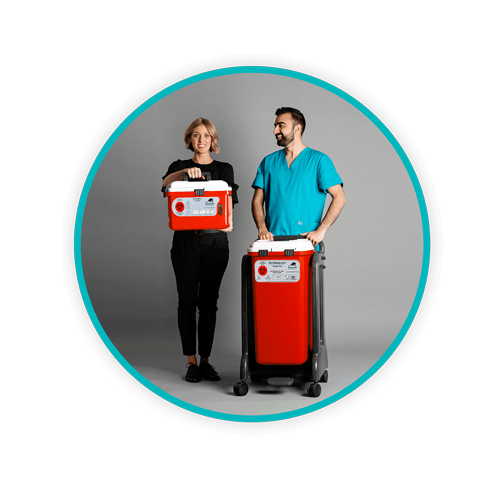The Future of Waste Management in Hospitals: Trends to Watch

Hospital waste management is a critical component of healthcare operations, essential for ensuring safety, compliance and sustainability. As healthcare facilities face increasing pressure from rising waste volumes, stringent regulations and environmental concerns, the need for forward-thinking waste management solutions has never been more urgent.
This article explores the emerging trends and innovations that are shaping the future of waste management in hospitals, as well as current proper management protocols that are positively contributing to the industry and the protection of human health at large.
TOPICS WE WILL COVER
1 / Current Challenges in Hospital Waste Management
2 / Emerging Trends Shaping the Future of Waste Management
3 / The Growing Market for Medical Waste Management
4 / Challenges and Opportunities
5 / Daniels Health: Leading the Future of Hospital Waste Management
6 / Experience the Daniels Difference Today
Current Challenges in Hospital Waste Management
The World Health Organization estimates that 15% of waste generated by healthcare activities is considered hazardous or biohazardous, including potentially infectious, toxic, or radioactive waste. This translates to millions of tons of medical waste produced globally each year, posing significant risks to public health and the environment if not managed properly.
In recent years, the COVID-19 pandemic has further highlighted the importance of effective hospital waste management. The surge in personal protective equipment (PPE) usage and other disposable medical items has led to an unprecedented increase in medical waste generation, challenging existing waste management systems and prompting a reevaluation of current practices.
As we look to the future, it's clear that medical waste disposal must evolve to meet these challenges while also addressing broader concerns about sustainability and environmental impact.
 Waste Volume & Diversity
Waste Volume & Diversity
Hospitals generate a wide range of medical waste types, including hazardous waste, pharmaceutical waste, sharps waste, and infectious waste. According to the American Hospital Association, hospital patients in the United States generate about 33.8 pounds of waste each day, which leads to about 6 million tons of waste annually. Managing these large volumes efficiently while ensuring proper segregation and disposal is a significant challenge for healthcare facilities.
 Safety Concerns
Safety Concerns
Mishandling of medical waste poses serious risks to healthcare workers and patients, including the spread of infectious diseases and injuries from sharps. The Occupational Safety and Health Administration (OSHA) emphasizes the importance of proper waste handling to prevent these risks.Research has shown that inadequate training and lack of proper protective equipment contribute to increased incidence of needlestick injuries and other waste-related accidents among healthcare workers.
 Environmental Impact
Environmental Impact
Improper disposal methods, such as over-reliance on landfills and incineration, contribute to significant environmental burdens. The Environmental Protection Agency (EPA) advocates for the sustainable development of forward-thinking waste management practices to reduce these impacts. The incineration of medical waste, in particular, has been linked to the release of harmful pollutants and greenhouse gasses, contributing to air pollution and climate change.
 Regulatory Pressure
Regulatory Pressure
Hospitals face increasing regulations regarding waste segregation, disposal, and documentation, making compliance in health care waste management both complex and necessary. Staying abreast of these evolving requirements is a constant challenge for healthcare facilities. In the United States, for example, the Resource Conservation and Recovery Act (RCRA) sets strict guidelines for the proper management of hazardous waste, including certain types of medical waste.
What Does the Future of Waste Management Look Like?
Sustainability and Zero-Waste Initiatives
The protection of human and environmental health and, thus, a push towards reducing waste generation at its source and diverting waste from landfills is gaining momentum.
-
Reusable Containers
Hospitals are increasingly adopting reusable containers, composting organic waste, and implementing sustainable packaging.
-
Circular Economy
The concept of a circular economy, which focuses on reducing, reusing, and recycling waste materials, is becoming more prevalent in the healthcare sector.
-
Green Operating Rooms
One innovative approach is implementing "green operating rooms." These initiatives focus on reducing waste through correct waste segregation, reducing overage, and avoiding products with large carbon footprints. Some hospitals have reported significant reductions in operating room waste through these programs, with potential cost savings and environmental benefits.
Regulatory Changes and Compliance Trends
Upcoming regulations are expected to tighten waste disposal rules, especially for hazardous and biohazardous materials.Hospitals need to prepare for stricter enforcement of segregation, labeling, and reporting requirements. These regulations aim to increase accountability and transparency across medical facilities, as outlined in the EPA's Hazardous Waste Generator Improvements Rule.
Increased Focus on Safety and Infection Control
Infection control in hospitals is paramount, and proper waste management plays a crucial role in preventing cross-contamination and protecting human health. Emerging practices include touchless disposal systems, single-use innovations, and containment solutions that minimize exposure to hazardous waste. Enhanced training and protocols for hospital staff, as recommended by the Centers for Disease Control and Prevention (CDC), ensure safe handling of medical waste. The COVID-19 pandemic has accelerated the adoption of these safety measures, with many hospitals implementing stricter protocols for handling potentially infectious waste.
This includes the use of specialized containment systems for COVID-19 pandemic-related waste and increased emphasis on personal protective equipment (PPE) for waste handlers.
 The Growing Market for Medical Waste Management
The Growing Market for Medical Waste Management
The medical waste management market is experiencing significant growth, driven by increasing awareness of the importance of proper waste disposal and stricter regulations.
According to market research, the global medical waste management market is expected to grow from $19.73 billion in 2024 to $23.88 billion in 2028 at a compound annual growth rate (CAGR) of 4.9%. This growth is attributed to several factors, including:
- The rise in the use of disposable medical products
- Increasing adoption of new guidelines by prominent industry players
- Innovative technologies in waste treatment and disposal
-
Growing volume of medical waste due to expanding healthcare services
Major trends in the market include the adoption of new treatment methods, the introduction of new recycling services, and a shift towards more environmentally friendly medical devices and waste treatment options.
Challenges and Opportunities
Despite the progress in health care waste management, several challenges remain:
-
Lack of knowledge: A lack of knowledge among healthcare professionals and sanitation workers regarding biomedical waste management regulations and management protocols leads to improper waste segregation and disposal.
-
Financial constraints: Implementing effective management systems can be costly, particularly for smaller healthcare facilities or those in resource-limited settings.
-
Technological barriers: Adopting new technologies for waste treatment and tracking requires investment and training.
-
Regulatory complexities: Navigating the complex web of regulations can be challenging for healthcare facilities. However, these challenges also present opportunities for innovation and improvement:
-
Education and training: There is a growing need for comprehensive training programs on proper waste management practices for healthcare workers at all levels.
-
Technological advancements: The development of more cost-effective and efficient waste treatment technologies could make advanced waste management more accessible to a wider range of healthcare facilities.
-
Collaborative approaches: Partnerships between healthcare providers, waste management companies, and regulatory agencies can lead to more integrated and effective waste management solutions.
-
Sustainability initiatives: The increasing focus on sustainability in healthcare presents opportunities for innovative approaches to waste reduction and recycling.
 Daniels Health: Leading the Future of Hospital Waste Management
Daniels Health: Leading the Future of Hospital Waste Management
Sustainable Management of Waste
With industry-leading reusable container systems and eco-friendly waste disposal solutions aligned with the EPA's Sustainable Materials Management principles—Daniels Health is committed to sustainability. Our approach focuses on reducing healthcare waste's environmental footprint without compromising health and safety standards.
Technological Innovations
Daniels adopts data-driven technologies to provide hospitals with smart waste management solutions. It offers transparent data that drives consultation and recommendations on strategies to reduce waste and costs. This includes the implementation of advanced tracking systems and analytics tools that help hospitals optimize our clients' waste management processes.
Regulatory Expertise
By staying ahead of regulatory changes, we ensure that healthcare facilities comply with the latest laws and guidelines, including those set by the EPA and OSHA. We provide expert guidance on correctly completing hazardous waste manifests and navigating complex regulatory requirements.
Safety-First Approach
Daniels Health's focus on safety and infection control is evident in our innovative sharps containers, pharmaceutical waste systems, and other industry-leading solutions. These solutions align with CDC guidelines for environmental infection control in healthcare facilities. Through our specialized waste containment systems, we have reported significant reductions in needlestick injuries and improvements in infection control.
Experience the Daniels Difference Today
The future of waste management in hospitals is characterized by sustainability, technological innovation, stringent regulatory compliance and an unwavering focus on safety. Daniels Health is at the forefront of these developments, offering innovative, sustainable and safe solutions that help healthcare facilities future-proof their waste management processes.
By partnering with Daniels Health, you can confidently navigate the complex landscape of medical waste management, ensuring compliance, safety, and environmental responsibility. Contact us today for a free consultation. By embracing new technologies, adhering to best practices, and prioritizing environmental stewardship, hospitals can not only meet their regulatory obligations but also contribute to a healthier, more sustainable future for all.
